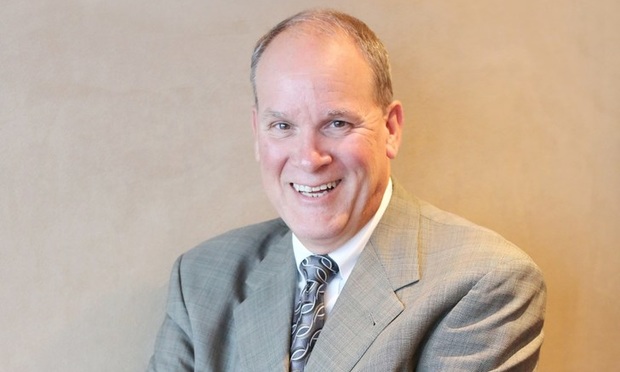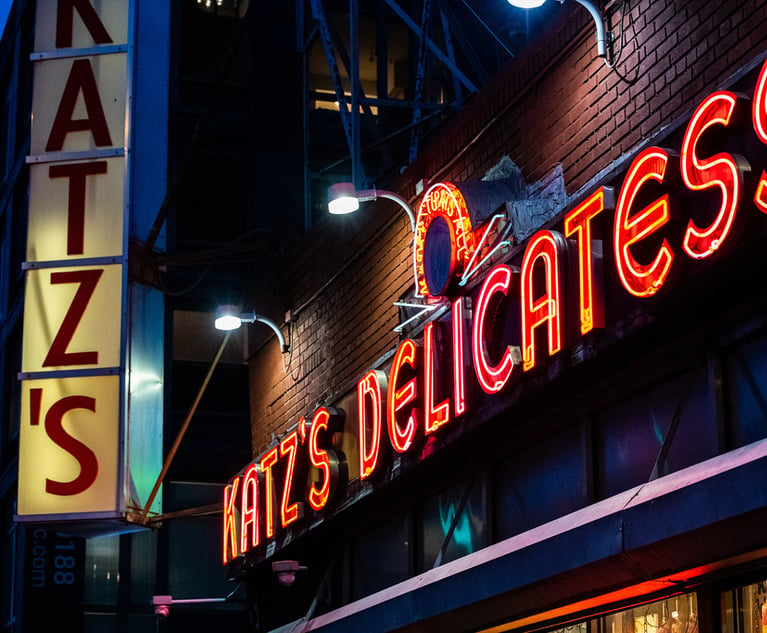Being a Franchisee in the Age of Pandemic
In his Franchising column, Ronald Gardner offers proactive steps franchisee representatives should be taking during this "sea change" caused by the COVID-19 pandemic.
March 27, 2020 at 10:49 AM
7 minute read
 Ronald K. Gardner
Ronald K. Gardner
My original plan was to write a column about Item 19 of the FDD, and how to interpret this most critical item, and how to maximize getting good information when looking to buy a franchise. But like all my other plans for the month, this one needed to be changed in response to the COVID-19 pandemic.
While no one really knows when or how long the virus will be ravaging the planet, or how long it will take for things to get back to "normal," as of this writing what we do know is that the market is a bear, there is no Madness, and the Green Jacket will be awarded at a later date. In other words, the world we lived in three weeks ago has changed dramatically—and for the foreseeable future.
This sea change will be a challenge for everyone. And as the foot soldiers on the frontlines of our consumer-driven economy, franchisees in certain industries are feeling this impact swiftly and severely. Initially, we will continue to see franchisees in the hospitality business suffer a significant downturn, as meetings, conferences and vacations are postponed or cancelled. Restaurants are also suffering a significant downward shift in demand, which is likely to continue over the coming period. From there, depending on the business of the franchisee, we will likely see continued deterioration of all businesses where direct customer interaction is required (e.g., car repair, gyms and fitness centers, specialty stores, etc.). In short, its going to be a rough ride.
In a perfect world, franchisors and franchisees will all recognize the threat that exists to their businesses and work together for the good of the brand that they both share in protecting. Forward thinking franchisors are doing what good franchisors should do: (1) providing timely and accurate information to franchisees about how the system is handling the health and safety of all constituencies; (2) telling franchisees what to do if someone in the organization is diagnosed with COVID-19, or is required to self-quarantine; (3) securing supply chains in a way that critical goods and services that the franchisees rely upon to operate are not disrupted; and (4) working with franchisees on plans that would allow both entities to even out the financial impact of the pandemic, including issues related to royalty relief, advertising fund holidays, and, in extreme cases, outright financial assistance to distressed franchisees.
Unfortunately, we do not live in that perfect world, and many franchisors do not see their franchisees as partners in sustaining the brand, but more like commodities that can be abandoned and replaced later. For franchisees of these enlightened types, their best hope lies in the concept of force majeure.
As most lawyers know, force majeure is a French term literally meaning "superior force." In sum, a force majeure event is one that neither party anticipated or controlled, but that has the effect of making a contract impossible or impracticable to perform.
In contrast to the covenant of good faith and fair dealing, and stated generally, force majeure is not engrafted into contracts by common law implication. That means that whether the current pandemic is cause for a franchisee to cease performing some or all of its obligations to the franchisor will turn on the precise language of the franchise agreement in play. Depending on the state law that is governing the agreement, an epidemic may or may not be found to be a qualifying event under such a clause.
And even if a force majeure clause exists, and covers the pandemic, one is left to wonder whether the current wave of "social distancing" will be found to qualify as a force majeure event. The fact that people are voluntarily staying away from commerce may or may not be something that a court would find as a "unforeseeable event" as it relates to any particular business. For example, is a boycott of one's business or brand "unforeseeable?" Perhaps. But is it one that is a force majeure? That is an interesting question. One should expect a lot of litigation over these issues in the coming months—assuming both franchisees and their franchisors can avoid bankruptcy courts as the remedy for the economic tsunami that seems to be coming our way. My sense is that as more states and cities move to "shelter in place" orders, a franchisees ability to claim a force majeure (especially if they are in a non-essential business), will increase dramatically.
In representing franchisees, one could also look to the common law doctrines of impossibility and/or impracticability of performance for relief as well. But the same issues will arise here. For example, is it "impossible" for a business to open simply because a city has banned gathering of 250 or more? Unless you're in a business that requires gatherings of that size, the answer may very well b "no."
So, what proactive steps should franchisee representatives be taking?
First, if a franchisee is in a system with an active franchise association, the franchisees should be using that communication vehicle to have an open and frank conversation about what is happening on the ground and whether the franchisor has, or is making, contingency plans around, health and safety, shut downs, supply chain disruptions, and sever financial distress by franchisees.
Indeed, it is times like these when a strong franchisor/franchisee association relationship can help the parties work together as entities with a mutual interest in minimizing harm to the brand and its infrastructure. On the other hand, if the relationship between the franchisor and the association is a hostile one, franchisees need to find a way to try to open a line of communication in this time of potential peril. The virus may prove to be the common enemy franchisors and franchisees can rally around as the look for a way through the coming challenges.
In the event no franchisee association exists, franchisees need to open swift and clear lines of communication with their franchisors about the challenges they are facing in their specific locations. Most franchisors, when given specific and compelling facts that justify some concession, will at least consider those types of request.
Concurrently, franchisee counsel should be researching the terms of the applicable force majeure clause, how such clauses have been interpreted under the applicable state law, as well as reviewing the contours of the concepts of impossibility and impracticability. Assuming a franchisor refuses to move, and franchisees are truly imperiled if they are required to continue to perform, moving aggressively to enforce these contractual or common law rights may be the only real solution—particularly if bankruptcy is not an option (and given the pervasive requirement of personal and spousal guarantees (an another issue I will address in a future column), it often is not).
Finally, franchisee counsel should be alerting their clients to not only the options that they have related to their franchisors, but potentially checking in on the performance of their suppliers and lenders, and urging them to develop a plan related to quarantined staff and management. If the franchisee does have to resort to a claim of force majeure, she should make sure to avoid a claim that it was her inaction in the face of this evolving situation that led to the franchisee's difficulties, rather than the virus we all face.
Stay safe.
Ronald K. Gardner is a partner at Dady & Gardner, P.A. He limits his practice to the representation of franchisees, dealers and distributors when they are in disputes with their franchisors, manufacturers and suppliers.
This content has been archived. It is available through our partners, LexisNexis® and Bloomberg Law.
To view this content, please continue to their sites.
Not a Lexis Subscriber?
Subscribe Now
Not a Bloomberg Law Subscriber?
Subscribe Now
NOT FOR REPRINT
© 2025 ALM Global, LLC, All Rights Reserved. Request academic re-use from www.copyright.com. All other uses, submit a request to [email protected]. For more information visit Asset & Logo Licensing.
You Might Like
View All
Here’s Looking at You, Starwood: A Piercing the Corporate Veil Story?
7 minute read
NYC’s Oldest Deli Agrees to Update Bathrooms, Entrances to End ADA Charges
4 minute read

Trending Stories
- 1We the People?
- 2New York-Based Skadden Team Joins White & Case Group in Mexico City for Citigroup Demerger
- 3No Two Wildfires Alike: Lawyers Take Different Legal Strategies in California
- 4Poop-Themed Dog Toy OK as Parody, but Still Tarnished Jack Daniel’s Brand, Court Says
- 5Meet the New President of NY's Association of Trial Court Jurists
Who Got The Work
J. Brugh Lower of Gibbons has entered an appearance for industrial equipment supplier Devco Corporation in a pending trademark infringement lawsuit. The suit, accusing the defendant of selling knock-off Graco products, was filed Dec. 18 in New Jersey District Court by Rivkin Radler on behalf of Graco Inc. and Graco Minnesota. The case, assigned to U.S. District Judge Zahid N. Quraishi, is 3:24-cv-11294, Graco Inc. et al v. Devco Corporation.
Who Got The Work
Rebecca Maller-Stein and Kent A. Yalowitz of Arnold & Porter Kaye Scholer have entered their appearances for Hanaco Venture Capital and its executives, Lior Prosor and David Frankel, in a pending securities lawsuit. The action, filed on Dec. 24 in New York Southern District Court by Zell, Aron & Co. on behalf of Goldeneye Advisors, accuses the defendants of negligently and fraudulently managing the plaintiff's $1 million investment. The case, assigned to U.S. District Judge Vernon S. Broderick, is 1:24-cv-09918, Goldeneye Advisors, LLC v. Hanaco Venture Capital, Ltd. et al.
Who Got The Work
Attorneys from A&O Shearman has stepped in as defense counsel for Toronto-Dominion Bank and other defendants in a pending securities class action. The suit, filed Dec. 11 in New York Southern District Court by Bleichmar Fonti & Auld, accuses the defendants of concealing the bank's 'pervasive' deficiencies in regards to its compliance with the Bank Secrecy Act and the quality of its anti-money laundering controls. The case, assigned to U.S. District Judge Arun Subramanian, is 1:24-cv-09445, Gonzalez v. The Toronto-Dominion Bank et al.
Who Got The Work
Crown Castle International, a Pennsylvania company providing shared communications infrastructure, has turned to Luke D. Wolf of Gordon Rees Scully Mansukhani to fend off a pending breach-of-contract lawsuit. The court action, filed Nov. 25 in Michigan Eastern District Court by Hooper Hathaway PC on behalf of The Town Residences LLC, accuses Crown Castle of failing to transfer approximately $30,000 in utility payments from T-Mobile in breach of a roof-top lease and assignment agreement. The case, assigned to U.S. District Judge Susan K. Declercq, is 2:24-cv-13131, The Town Residences LLC v. T-Mobile US, Inc. et al.
Who Got The Work
Wilfred P. Coronato and Daniel M. Schwartz of McCarter & English have stepped in as defense counsel to Electrolux Home Products Inc. in a pending product liability lawsuit. The court action, filed Nov. 26 in New York Eastern District Court by Poulos Lopiccolo PC and Nagel Rice LLP on behalf of David Stern, alleges that the defendant's refrigerators’ drawers and shelving repeatedly break and fall apart within months after purchase. The case, assigned to U.S. District Judge Joan M. Azrack, is 2:24-cv-08204, Stern v. Electrolux Home Products, Inc.
Featured Firms
Law Offices of Gary Martin Hays & Associates, P.C.
(470) 294-1674
Law Offices of Mark E. Salomone
(857) 444-6468
Smith & Hassler
(713) 739-1250






